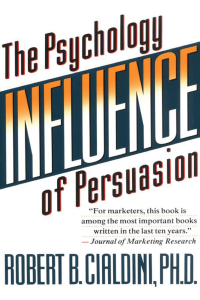For solopreneurs venturing into the competitive landscape of internet marketing, understanding the underpinnings of human behavior is as crucial as the technical know-how of SEO or the creativity of content marketing. "Influence: The Psychology of Persuasion" by Robert B. Cialdini is not just a book but a treasure trove of insights into the subtle yet profound triggers that compel people to say "yes." While it doesn't cater exclusively to internet marketing, the principles laid out in this book are universal, transcending boundaries of medium or market.

Influence: The Psychology of Persuasion
"Influence" doesn't provide marketing strategies; instead, it delves deep into the psychology behind the decisions that consumers make. Cialdini, through rigorous research and compelling narratives, introduces the six universal principles of persuasion:
- Reciprocity: The social obligation to return what another person has provided us. If you offer something of value to your audience, they are more likely to give you their attention, loyalty, or business in return.
- Commitment and Consistency: Once we make a choice, we encounter personal and interpersonal pressures to behave consistently with that commitment. For solopreneurs, this underscores the importance of maintaining a consistent brand message and image.
- Social Proof: People look to the actions and behaviors of others to determine their own. You can leverage this by showcasing testimonials, reviews, and social media shares.
- Authority: People have a tendency to obey authority figures. Establishing yourself as an expert in your niche can significantly enhance your influence.
- Liking: People are easily persuaded by other people that they like. Building a personal brand that connects with your audience on a human level can be incredibly powerful.
- Scarcity: Opportunities seem more valuable to us when their availability is limited. Limited-time offers or exclusive products can create a sense of urgency and drive action.
For solopreneurs, "Influence" is particularly beneficial because it focuses on understanding and empathizing with the customer's mindset. In the internet marketing realm, where there's an overwhelming amount of content and products, understanding these principles helps you craft your messages and campaigns in a way that resonates with the audience on a psychological level. It's about creating a connection that feels personal, even in a digital space.
However, it's important to note that while "Influence" provides the principles of persuasion, it doesn't offer a step-by-step guide on how to implement these strategies digitally. It won't teach you how to build a website, write SEO-optimized content, or navigate the algorithms of social media platforms. What it does, though, is give you a solid foundation in the human psychology that drives all those interactions. It's up to you, the solopreneur, to creatively apply these principles within your unique marketing strategies.
In conclusion, "Influence: The Psychology of Persuasion" is a seminal read for solopreneurs breaking into internet marketing. It equips you with the understanding of what makes your potential customers tick, what drives them to engage, and ultimately, what compels them to say "yes." In a domain where understanding your audience is half the battle won, Cialdini's book is the secret weapon that every solopreneur should have in their arsenal. It's not about manipulating consumers but about understanding them so deeply that you know how to provide value they can't help but say "yes" to.
ChatGPT Prompts:
"Influence: The Psychology of Persuasion" by Robert B. Cialdini is a seminal book that explores the psychology behind why people say "yes" and how to apply these understandings. Here are some specific prompts for this book:
Understanding the Concepts:
- "Can you summarize Cialdini's six principles of persuasion and discuss how each is supposed to influence people's behavior?"
- "How does the principle of 'Reciprocity' influence consumer behavior, and why is it so powerful?"
Application of Principles:
- "How can a business use the principle of 'Scarcity' to increase demand for a new product?"
- "In what ways can the principle of 'Authority' be used ethically in marketing to build trust with customers?"
Comparison with Other Strategies:
- "How do Cialdini's principles of persuasion correlate with the techniques used in digital marketing today?"
- "Are there modern marketing or negotiation strategies that seem to conflict with Cialdini's principles of persuasion?"
Exploring Specific Principles:
- "Can you provide current examples of how the principle of 'Social Proof' is used in online settings, especially on social media?"
- "How might the principle of 'Commitment and Consistency' be leveraged in a subscription business model?"
Critiques and Limitations:
- "What criticisms have been raised regarding the application of Cialdini's principles of persuasion in an ethical context?"
- "Are there any cultural limitations to the effectiveness of the six principles of persuasion?"
Expansion Ideas:
- "Beyond business, how can Cialdini's principles be applied in interpersonal relationships or personal goal setting?"
- "How might educators use the principle of 'Liking' to create a more engaging and positive learning environment?"
Real-world Examples:
- "Can you identify a recent advertising campaign that effectively utilized the principle of 'Reciprocity' and discuss why it was successful?"
- "What's a real-world example of a misuse or overuse of the 'Authority' principle, and what were the consequences?"
Reflection and Personal Application:
- "How has reading 'Influence: The Psychology of Persuasion' changed your perspective on marketing and daily interactions?"
- "Which principle of persuasion do you find most prevalent in your life, and how do you see it influencing your decisions?"
By harnessing the Power of Few-Shot and Multi-Shot Learning in Conversational AI, these prompts are designed to deepen understanding and facilitate discussions about the core concepts in "Influence: The Psychology of Persuasion" and how they're observed and applied in various facets of life.
